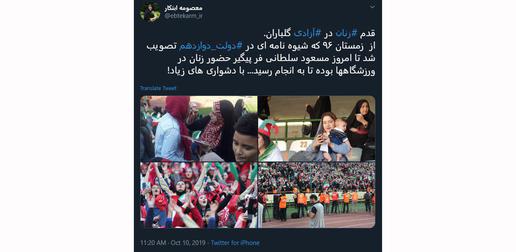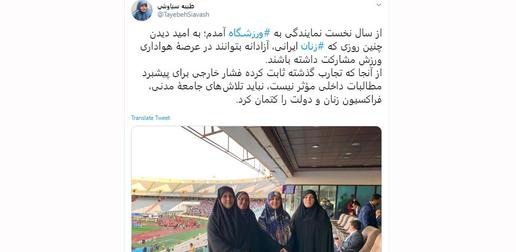Shortly after Iranian female football fans celebrated the first time they were allowed in a stadium on October 10, Iranian authorities promoted their own version of events — essentially taking credit for women being granted their rights after four decades, despite the fact that they had blocked these rights for so long.
On September 21, the International Football Federation (FIFA) posted a statement on its official website that amounted to an ultimatum to Iran: either open the doors of stadiums to women or else Iranian football will be suspended. The decision, however, rested not with the Iranian Football Federation, but with the Islamic Republic government, and the regime that had stubbornly kept Iranian women out of the stadiums for decades. However, the government had no choice and yielded to FIFA’s demands.
As FIFA had demanded, the football match between Iran and Cambodia on October 10 became the landmark game, where women were present in Iranian sports stadiums.
But even then, Iranian authorities cheated. FIFA had clearly stated: “Women need to be allowed to enter football matches freely and ... the number of women who attend the stadiums [must] be determined by the demand, resulting in ticket sales.” When the game started, however, 20,000 seats at Azadi Stadium remained empty because officials had refused to sell the tickets for these empty seats to women.
Farahnaz, one of the women who had succeeded in buying a ticket and who got into the stadium, tweeted that she saw one woman run toward the FIFA observers when she spotted them. Despite efforts by policewomen to block her, she reached the officials and informed them that Iranian authorities had cheated, and had not followed FIFA guidelines when it came to ticket sales for women [Persian link]. “[FIFA’s] President [Gianni Infantino] knows about it,” one observer replied, shaking his head. “But live with it for now and continue your efforts.”
Despite this, however, the government grabbed the chance to take credit for women being allowed into Azadi Stadium.
On the day of the match, Masoumeh Ebtekar, Vice President of Iran for Women and Family Affairs, took the opportunity to claim that President Rouhani’s government was the guiding force that pushed the gates of the stadiums open to women. “This is the result of three years of efforts by Mr. Hassan Rouhani and the ministry of sports,” she told reporters as she was entering the VIP section at Azadi Stadium. “We tried hard to arrive at this day and we are very happy.” When asked whether the October 10 game had opened the way for Iranian women to attend domestic Pro League games as well, Ebtekar paused for a few seconds and said: “Slowly, slowly.”
What a Coincidence!
In other words, it just so happened that the government succeeded in opening the doors of the stadium to women — in a limited and discriminatory manner — on exactly the same day that FIFA’s ultimatum was to take effect.
In a tweet, Ebtekar claimed that the efforts started with an “advisory memorandum” approved by Rouhani’s government in March 2018 and culminated in “today ...after so many difficulties.” Ebtekar, however, did not mention under what conditions that “advisory” — not an order, not a directive, but an advisory memorandum — was brought up at the cabinet meeting.
Ebtekar was perhaps not privy to President Rouhani and his cabinet members’ attempts to undermine the situation in March 2018, when FIFA’s President Gianni Infantino had visited Tehran with the specific purpose of holding talks with President Rouhani about allowing women into stadiums.
President Rouhani and Gianni Infantino met on March 1, 2018, at the VIP lounge of Tehran’s Mehrabad airport. “The simplest solution for Iranian football is to suspend it,” Infantino told the newspaper the Guardian a week later. “They can prevent women from entering stadiums and lose football completely. But I prefer negotiations and, as much as possible, avoid applying pressure. But if no other way is left, we definitely have more powerful means to deal with Iran.”
It was at that time that Rouhani ordered his cabinet and, of course, sports minister Masoud Soltanifar, to write the memo.
Ahmadinejad for Women Fans, Believe it or Not
The history of pressured campaigns to allow Iranian women into stadiums, however, is somewhat different from the one set out by Masoumeh Ebtekar. Against all expectations, Mahmoud Ahmadinejad was the only Iranian president over the last 40 years who not only issued a “whimsical order” to allow women into stadiums, but even stood up to religious authorities for a few months.
In 2006, Ahmadinejad wrote a letter to Mohammad Aliabadi, head of the Physical Education Organization, the predecessor to the ministry of sports, demanding that he prepare stadiums for woman spectators. In the cabinet meeting following this, both Aliabadi and Ali Saeedlou, the vice president for executive affairs, asked Ahmadinejad when this project was to start. It was an order, Ahmadinejad told them, not a “project.”
“I am the foremost opponent of the presence of women in stadiums,” announced Ahmad Khatami, Tehran’s temporary Friday Imam, in his weekly sermon that Friday. But the sermon could not persuade Ahmadinejad to retreat. In September 2006, he wrote another letter to the head of the Physical Education Organization, demanding to know what progress had been made for women spectators.
Less than 10 days later, a group of influential Iranian Shia authorities — Mohammad-Taqi Mesbah-Yazdi, Naser Makarem Shirazi, Mohammad Javad Fazel Lankarani, Lotfollah Safi Golpayegani, and Mirza Javad Tabrizi — wrote separate letters to Ahmadinejad and asked him to rescind his order.
Eventually Ahmadinejad was forced to give in and to rescind his order, after the Supreme Leader Ayatollah Khamenei vetoed the idea. Ahmadinejad claimed that initially Khamenei had approved, but when the political climate became inhospitable, Khamenei told him to abandon the idea because “it is not the primary issue for the country.”
Echoing other religious authorities, Ahmad Khatami said that the decision not to allow women in stadiums stemmed from a need to protect women's chastity and that the promotion of wearing hijab was central to this. If women attend games, he said, there could be no guarantees that chastity could be preserved.
But now that women have been allowed in, Masoumeh Ebtekar is not the only person trying to claim the credit for the government. “I am thankful for the support of the esteemed president, high security and police officials and my colleagues at the ministry of sports and the [football] federation, whose cooperation made this success possible,” tweeted Masoud Soltanifar [Persian link].
But it was the sports minister who, in June of this year, told the state-owned newspaper Iran-e Varzeshi (“Iran Sports”) that although women would be allowed to watch the Iranian national football team qualification games, they would not be allowed to enter stadiums for Iran’s Pro League competitions.
Ali Rabiei, spokesman for the government, was yet another government official who tried to take the credit for women being allowed into stadiums. “The US, with all its might and all its allies could not force us to yield,” he told reporters two days before the game. "Do you think we would yield to FIFA’s pressures? No, this was what the government wanted.”
But just a month before Ali Rabiei’s claim, Ali Vaezi, the president’s chief of staff, had told reporters that “allowing women into stadiums is not prudent at all” — this from the chief of staff for the same president who, according to Ebtekar and Soltanifar, played the deciding role in opening the gates of the stadiums to women.
However, a “truth test” is on the way. Iranian officials cheated on ticket sales for women wanting to watch the game on October 10, even though FIFA’s observers were present. But even this achievement will not guarantee that women will be allowed to watch Iran’s Pro League games when there are no FIFA observers present. Will Ebtekar and others still claim a victory for the government? Or will they hide behind a wall of silence?
Related Coverage:
Women in Azadi Stadium After Long Ban, October 10, 2019
Historic Moment for Iran as Women Allowed into Stadium to Watch Football, October 10, 2019
Iran’s Ban on Female Journalists Entering Stadiums, October 9, 2019
International Football Federation Scrutinizes Iran’s Ticket Quotas for Women, October 7, 2019
Iran: Stadium Seating Cap Endangers Women, October 5, 2019
The World Reacts to the Tragic Death of the “Blue Girl”, September 26, 2019
FIFA Ultimatum to Iran: Let Women in Stadiums, September 23, 2019
FIFA Responds to IranWire about the Death of the “Blue Girl”, September 10, 2019
Woman Who Set Herself on Fire Dies, September 9, 2019
Iran Attempts to Fool FIFA, August 27, 2019
Decoding Iran’s Politics: Football and State Interference, June 11, 2019
visit the accountability section
In this section of Iran Wire, you can contact the officials and launch your campaign for various problems


























comments